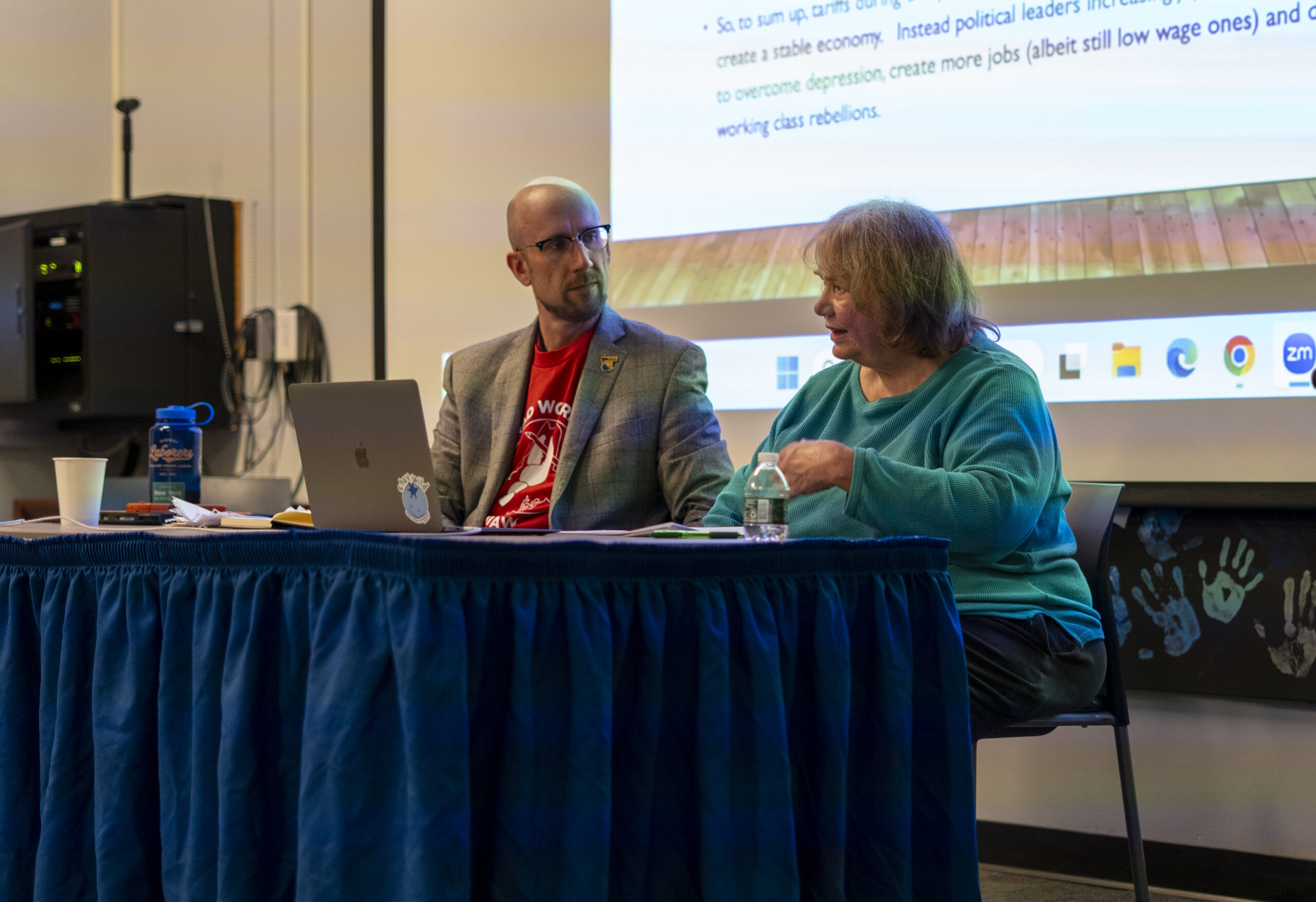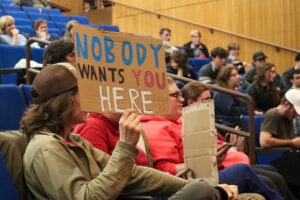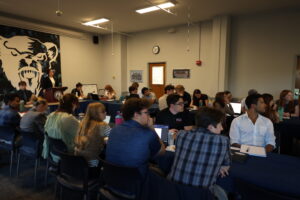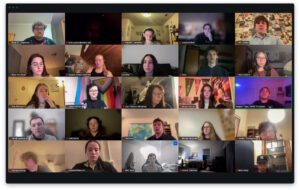On Nov. 20, the University of Maine Bureau of Labor Education hosted “Tariffs, Workers & the Global Economy,” the fourth event in their Labor Spotlight Series. The goal was to educate attendees about tariffs and the economy in lieu of President Donald Trump’s tariff platform. Attendees were taught to recognize things like the different kinds of tariffs, who winds up paying the difference and how sweeping economic changes impact domestic businesses.
The panelists included James Myall, Jason Shedlock and Elizabeth McKillen. Myall is Maine Center for Economic Policy’s (MECEP) “lead on the inclusive economy” and an economic policy analyst, according to MECEP’s website. Shedlock is the president of two labor unions and works with two more. McKillen is a Professor Emerita of History at UMaine, and is a published author of both books and articles, according to her faculty page.
The event began with Myall’s definition of tariffs, which are an import tax collected at the point of import — typically the border, which then go to the government as revenue. A clarification was made by Myall that while President Trump claims foreign entities pay the difference on his imposed tariffs, it is usually the consumer who pays at least part. Myall said we have been seeing tariff costs most often absorbed by the consumer when there is low market competition.
Myall distinguished “good” tariffs from “bad” tariffs by stating that good tariffs are usually targeted to a certain industry or country, proportionate to the problem at hand, protective of a certain industry and consistent; whereas bad tariffs are indiscriminate of country or industry, disproportionate, tax inputs and essential imports such as items we cannot produce domestically, and chaotic. According to Myall’s presentation, President Trump has imposed the highest tariff rates since 1936.
“Trump’s policy, I would argue, is maybe less thoroughly thought through,” said Myall.
There are three kinds of tariffs: protective, reciprocal and punitive. Protective tariffs protect domestic industries, reciprocal tariffs match those levied by other countries or balance subsidies and punitive tariffs serve to express presidential disdain.
“[Punitive tariffs are] tariffs without economic rationale and more of a political one, and that can be used as a bargaining chip,” said Myall, adding that they can be troubling economically.
According to the U.S. Constitution, it is actually Congress who has the power to levy tariffs, not the President. Section 8 of Article I states, “The Congress shall have Power To lay and collect Taxes, Duties, Imposts and Excises, to pay the Debts and provide for the common Defence and general Welfare of the United States.” As such, President Trump’s ability to lay tariffs is currently being challenged by the Supreme Court, according to CNBC.
The current tariff platform could cost the average American household about an additional $2,000 per year, though this number is expected to decrease as people stop investing in as many goods. Tariffs tend to hit lower-income households harder because higher-income households typically invest in services over goods, a luxury lower-income families cannot afford.
Speakers also suggested that the kinds of tariffs currently imposed are expected to hurt the economy, as people buy fewer items for more money, which decreases demand for local businesses and goods; this then leads to layoffs and a further decrease in demand. Foreign retaliation is also being considered as an economic disadvantage.
This impacts workers because, according to Shedlock, corporations not have to bargain for tariffs, but for profits. These profits are not seen by workers, who are asked to do more for less money.
“Hastily written policy, even with the best intentions, is going to fail us,” said Shedlock.
Shedlock added that while indiscriminate tariffs do not inherently make goods more expensive, they do allow domestic companies to raise their prices under the tariffed foreign rate and create competition while exploiting the consumers.
He gave a shoutout to the UMaine Graduate Workers Union (UMGWU), who have been bargaining their first contract for the last two years, but added that the reality of unions is currently bleak. Shedlock stated that basic labor laws are not being enforced as the organizations made to protect them have been disbanded.
McKillen’s presentation addressed the history of tariffs and corrected any mistaken claims made by the President.
McKillen highlighted President Trump’s admiration of the Gilded Age (1870 to 1900) and President McKinley, whom he has praised as having enriched the country through tariffs. McKillen shared that this was false, as the Gilded Age was actually a period of intense class conflict, and about 3 million people, or 12% of the workforce at the time, were unemployed. In fact, there was even a major depression in 1893. There were many strikes as President McKinley became more interested in exports than his high tariff platform, and McKillen said his policies did not enrich workers or create a single economy.
McKillen pointed out that despite President Trump’s claims, tariffs from 1913 to 1929 were not the cause of the Great Depression. She also pointed out that his claims about the North American Free Trade Agreement (NAFTA) were correct but inflated.
In an interview following the event, McKillen advocated for a different economic style than the tariff heavy plan introduced under the Trump administration.
“I think initially, we need some short term changes. And so it has to, in part, involve not further weakening the labor movement during Trump’s period… I’ve always been a fan of socialism, but it’s been hard here. I think also if we got rid of the Electoral College, for example, so everything was decided by popular vote, Democrats would have more of a chance” she said. McKillen added that Democratic socialism would be the best economic policy for the United States, instead of just high tariff or free trade platforms.
McKillen also stressed the impact of tariffs on Maine, saying that they were “disastrous” in President Trump’s first term, especially given that they targeted Maine blueberries and lobster.
“There should never be that much power in the hands of one person, which is why we need more Congressional checks and balances.”









